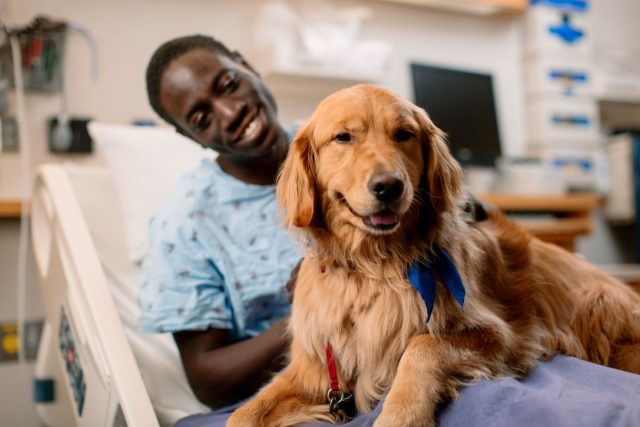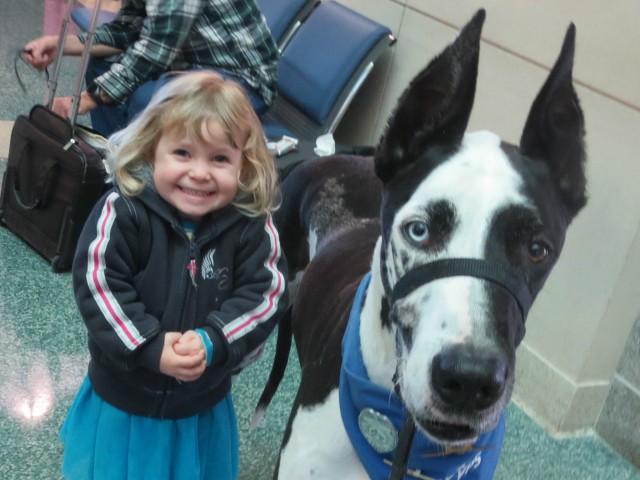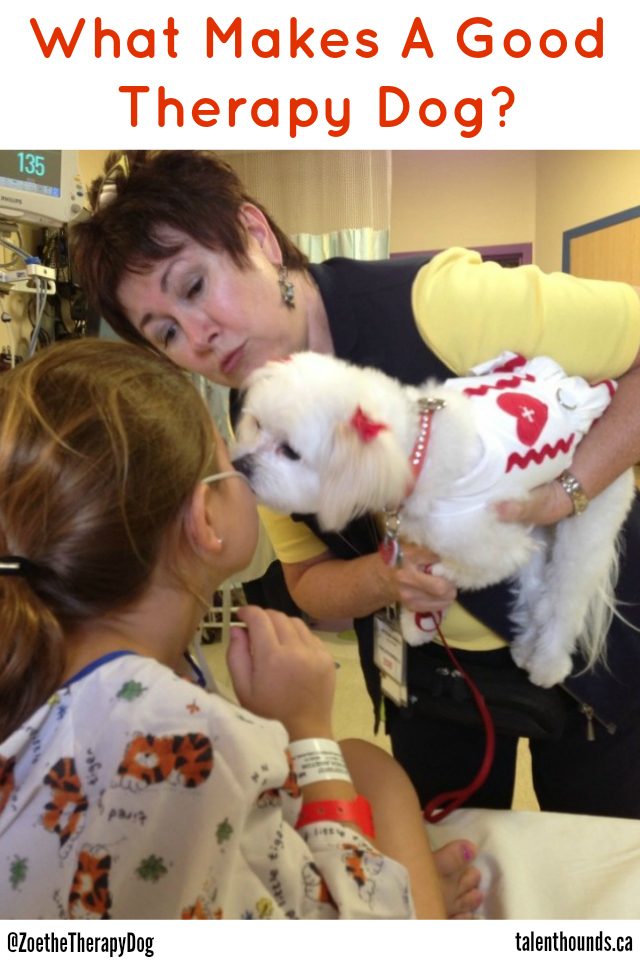Could My Dog Be A Good Therapy Dog?
We’ve featured many amazing therapy dogs and service dogs big and small making a difference over the years on our site, at events, and in our TV documentary series. But there are so many more dogs out there having an incredible impact every single day, especially as therapy dogs. There is more and more research about how they make our lives better.
What is a therapy dog exactly and what makes a therapy dog so good at what they do?
What Exactly is a Therapy dog?
Different than a Service dog or an Emotional support animal, therapy dogs have a unique place in our society. Both service and emotional support dogs are directly paired with an individual and generally trained to assist with that person’s unique disability. Emotional support animals have less specified training and often offer people with emotional or psychological trauma comfort and affection. Though their owners may also have physical disabilities, these dogs are not always afforded the same exceptions as service dogs in terms of being permitted places where dogs aren’t allowed. They are often registered by their owners after bonding rather than being certified first.
Does Breed Matter?
Yes, and no. We recently did a post about dog intelligence and what makes certain breeds more obedient than others and the answer might surprise you. An expert on the matter, Stanley Coren breaks down dog intelligence into 3 categories, only one of which can be solely attributed to breed. Much like certain dog breeds are known for their intelligence, some breeds of dogs might be more inclined to being affectionate or empathetic. When it comes to being an ideal therapy dog though, we’ve found it’s the individual dog that is special.

We recently featured beautiful Bridgette who is a rare breed among therapy dogs. You can read more about her HERE.

credit: Mayo Clinic
Check out this recent article all about the impact therapy dogs can have on people who are in the hospital. Plus see wonderful rather large Therapy Dog Olie in action and hear about the benefits for hospital patients and staff, even though he is not a little lapdog by any means. He puts a smile on everyone’s face and helps reduce stress.
Generally, therapy dogs offer support to many, rather than just one individual. In the case of dogs like our best Fren Gizmo from Gizmo’s Frens, they can be life-savers and make such a difference with hundreds of thousands online and in person.
They may even have started off as an emotional support dog when their owner made the decision to share their talent for soothing with the world. Therapy dogs can serve a variety of communities from hospitals and schools, to nursing homes, universities or the scene of a tragedy.
No matter the location, all therapy dogs serve a similar purpose; to inspire affection and confidence in the people they meet and reduce stress.

You can also read this guest post from Cathy Armato on her Therapy Husky Icy and the amazing work they do together.
How can I tell if my dog could be a Therapy dog?
The SPCA identifies three major qualifiers that can indicate whether your dog is suited to being a therapy animal.
- The first qualifier is your dog’s personality: your dog must have a calm temperament. A dog that’s incredibly affectionate but tends to show it by jumping, pawing or licking, might not be the best choice for people who may be easily frightened in a vulnerable setting.
- The second qualifier is that your dog is a “people dog”. If you think your dog would be a good therapy dog, you have to really think about how they would react to constantly being introduced to strangers. Your dog may have infinite patience with you and your family but not be so into the idea of a classroom of kindergarteners learning to read.
Our wonderful friend Bocker Labradoodle was always happy to greet anyone with a big kiss and a cuddle. He was an amazing therapy dog and is missed dearly. I loved his Bocker smooches.
- The third qualifier is that your dog is non-reactive. As well as being faced with strange people and places on a regular basis, therapy dogs may also be in settings where there are lots of loud sounds or unexpected situations in which it would be crucial they not react adversely. If your dog is easily spooked or distracted, they may not be the best fit as a therapy dog. That doesn’t mean they aren’t still perfect for offering support to you and yours though!
If your dog does seem to demonstrate these three characteristics and they are over one year of age, it’s quite possible they’d make an excellent therapy dog.

We also recently did a story on Storm, an adorable rescued therapy dog who’s mom perfectly describes how she knew Storm would be so good at what she does.
“Storm has a very infectious waggy disposition! She actually won a prize at our local summer fair this year for the waggiest tail. Right from the beginning we knew we had a very special dog, she was so placid and well behaved. She loves attention from anyone and is wonderful with children.”
Registering a Therapy dog
Registering your dog as a therapy dog varies depending on your location. Generally, you want to look for a reputable organization that can help facilitate and arrange for you the types of visits you’d like your dog to go on.
Do some research first. If you’d like your dog to work with children, a program like R.E.A.D. might be a good place to start looking. If you’d like your dog to work in hospitals or nursing homes you can look into programs that focus more on those areas like St. John’s Ambulance in Canada.

Dozer the Great Dane proves any dog big or small can make a difference.
A good program is likely going to have some sort of application process or training program that you need to go through before they arrange visits for you – and this is a good thing. There are several places online where you can register your therapy dog for a fee, but having your dog ‘registered’ isn’t going to get you in the door to actually make use of that certification to help others.


Thank you so much for including my Hucky, Icy in this wonderful post! Therapy dogs can break through emotional barriers and help people in so many ways. They are full of love and they never judge. I loved your beautiful tribute to Bocker, he was such a special therapy dog, he will be missed by so many.
Love & Biscuits,
Dogs Luv Us and We Luv Them
Great post. As a past service dog trainer and therapy dog evaluator and instructor, it’s so important to ensure the dog wants to do the job. Then, to ensure that the human/dog are a true team. Thanks for this post.
Absolutely. I would like to but I know Kilo the Pug is not suited sadly. At least I get to accompany other wonderful friends. It is a big time and emotional commitment for dogs and humans.
So..not all dogs can be therapists? 🙂
Great post about therapy dogs! We’ve learned that just about any dog is a candidate with the right temperament and willingness.
Aww, such sweet, loving dogs. It definitely takes a special mix of loving and calm to make a good therapy dog. Each of mine have either the loving or the calm part down, but not the right mix of both! lol
Jasmine would have made a great therapy dog as she demonstrated on several occasions. Cookie has the potential but has too much energy 🙂
Thanks for the post! When our toy poodle retires from agility, I’ve thought about training him to be a therapy dog. He’s a quiet and calm dog, who loves people.
Mr. N has done therapy work before. I used to run him for a few hours beforehand and then he would be calm for visits!
Mom thinks that my sisfur Taffy a Cocker Spaniel would be a great therapy dog. She loves people and is always happy and friendly. She gets a little excited but mom thinks she’s completely untrainable but because she was her mom’s dog she does seem to like elderly people and children. Mom doesn’t have the time or patience to see if she could be come one though, wishes she did. Love Dolly
I think that Therapy Dogs do such wonderful work! Perhaps one day I’ll have a dog with the right personality to be a therapy dog.
Great post, I have learned there are big difference but I also feel that if a dog is trained correctly to be a service dog that is all that counts. I have seen unfortunately people buying service dog vests on line and then claiming they are trained etc which is all a lie and personally those sales should be stopped.
I have interviewed therapy cats and their owners for our blog. I get the impression temperament is key! Summer at Sparklecat.com gives terrific insight into the work of therapy cats, so I love hearing about dogs!
I’ve read many articles about therapy dogs and wish there were in the hospitals where my dad has been a lot this year. He loves animals and I’m sure they would bring a smile to his face.
My old retriever was a therapy dog.
Such valuable work these dogs do
Excellent post! I lost my heart to all of them! Therapy Dogs are so amazing. When my mother fell and was hospitalized shortly before her passing, a Therapy Dog and handler visited her in her room. She had been confused and naturally upset at being there and was not smiling (something she always did). Enter the Therapy Dog that happened to be a Standard Poodle. My mother had Poodles all of her adult life! An immediate connection was made and my mother sat up and began petting the dog and talking about her four Poodles. It was amazing to see this dog help bring a spark back to my Mom. I have spoken with many Therapy Dog handlers for my blog and for my show, and they truly work miracles in people’s lives. I just Pinned this on my Pinterest “Bark About” board!
I love hearing wonderful stories like this – sending pug hugs thanks.
I think Pierre would make a good therapy dog but Bentley would not. It is something I’d like to do in the future.
My dog has been a certified therapy dog for the past 5 years (4 years of being child-certified), and we visit a local hospital. He is by no means a small dog either–he’s a German Shepherd/St. Bernard mix and tips the scales at 115 lbs! He is truly a gentle giant though, and has helped many people (patients, staff, you name it!) overcome their fear of (large) dogs, and has helped put smiles on the faces of many stressed out parents and doctors! When I’m asked the difference between a service dog and a therapy dog, I always stress that a service dog WORKS for one person, but a therapy dog is there for everyone to enjoy! And I always say that ALL dogs are therapy dogs, some just turn pro! Woof!
Yes we so agree that all dogs are therapy dogs but some just turn pro. I’d love to do a feature on your dog as we are doing some posts and videos on the benefits of dogs for kids.
What an informative and inspiring post. Thank you!